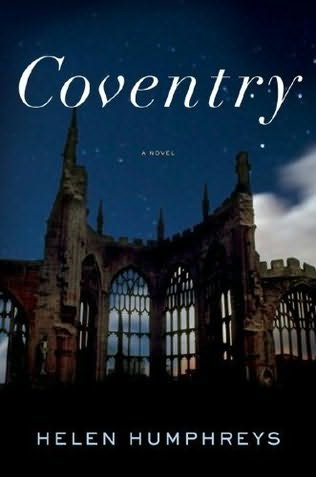 Two reviews in two days? I'm on some kind of a roll here. I think that flu bug I've been fighting is tickling my cortex into action. Not action of a necessarily productive sort, but action nonetheless! Good job, typewriter-banging monkey!
Two reviews in two days? I'm on some kind of a roll here. I think that flu bug I've been fighting is tickling my cortex into action. Not action of a necessarily productive sort, but action nonetheless! Good job, typewriter-banging monkey!Better not jinx it by talking about it, so without further ado:
 Coventry
Coventryby Helen Humphreys
We are all the products of our triumphs and our tragedies. Harriet lost her new husband to the trench warfare of World War I. Maeve bore a child out of wedlock, and has to fend for herself ever since. In one night, trapped in Coventry during the German bombing raids of the Second World War, both women find their pasts effecting their decisions in surprising ways."For all her efforts Harriet can't really remember Owen very well. His memory has been worn thin from use, like a patch of clot rubbed too vigorously and too often. She has her ideas of him and of their happiness, but at this point the reality of him has been subsumed into her own need to remember him in a certain way. In real life he would never have bent to her will, but now that he's dead she can do whatever she chooses with him. This knowledge sickens her, but she is also powerless against it."
This sketch of a narrative has the potential to go one of two ways; either the resulting novel will be an overly sentimental gush of nostalgia and female empowerment, or it will be a subtle and often wrenching study of loss and remembrance. Luckily, Canadian author Helen Humphreys is at the helm, and Coventry, her first novel after The Lost Garden (a Canada Reads selection for 2003), is a remarkably moving and insightful effort, stark and clear.
There is very little in the way of surprise in Humphrey's compact novel; Coventry is not a story of momentum, and there is a foreboding sense of inevitability hanging over the proceedings, as if all this has already passed. The women had met once previously, on a care-free day before WWI had begun, and there is a sense of the inescapable that the two will meet again. This sense of the novel being an elegy serves to drag down the story to a standstill at times, resulting in a lack of immediacy that blunts the ultimate ending. Add on an unlikely coincidence involving Harriet and a stranger not to be named here, and Coventry falls shy of becoming the masterpiece it yearns to be.
Humphrey's strengths comes out in her characterization of Harriet and Maeve, two women as vital as any that have stalked the pages of Canadian literature. Harriet is scarred, hardened and alone after the loss of a husband she barely new; Maeve is exhausted from life, and her longings to become an artist have fallen by the wayside along many such sadly disposed-of dreams. As Humphrey alternates from each woman's POV as the long night wears on, we see their lives intersect on paths they never planned on traveling.
Humphrey's other great triumph is her evocation of the bombing raids; nightmarish imagery abounds as catastrophe follows catastrophe, numbing the populace insensate. "My wife was killed," remarks a man with a chilling distance from his words, "standing in the kitchen, making us a cup of tea." Helen is in the thick of it, running through the devastation as people perish in ways both savage and calm. Maeve is in the countryside, fleeing, apart from her son and surrounded by strangers. Coventry is a city destroyed beyond recognition, and Humphrey presents an unflinching portrait of people stunned by incomprehensible violence that is sadly all too identifiable today.
Coventry is an often stunning novel, a crystal-clear evocation of things lost and found again under extraordinary circumstances. Its flaws only serve to highlight Coventry's tremendous strengths.
MONKEY LIKES A LOT

3 comments:
I read this book last fall and it is still one of my favourite reads. Here's my review on BookCrossing.
I read this one three or four books ago and loved it! I found her imagery so beautiful and in complete contrast to the stark reality of what living through that night must have been like. My only dissapointment with Coventry came with the last page — I really wanted to read the flipside of that postcard!
Glad to know you thought this one deserving of the "MONKEY" seal of approval.
Though you liked it, I'm hung up on the "dragged to a standstill" bit. Seems to me that's what those who claim to hate "CanLit" always refer to and I have two guesses as to who they're referring (Munro and Shields-- the latter of whom I actually like). I'm a fan of CanLit because I think there's more out there with some actual life. I've yet to read anything by Humphrey's but man, I'm skeptical.
Post a Comment